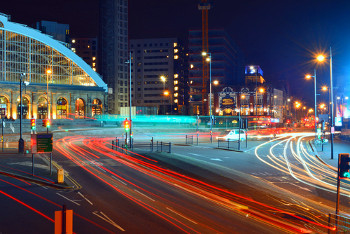Reform of rail fare regulations could deliver a significant reduction in Britain’s carbon footprint over the next 10 years, a key industry body has said.
The Rail Delivery Group (RDG) pointed to recent analysis from consultants KPMG suggesting that overhauling the regulations that underpin the rail fares system could encourage an extra 300 million people over a decade to travel in seats that are currently empty on long-distance and regional trains.

Liverpool Lime Street Station
The RDG, which represents train companies and Network Rail, said that its own analysis found that a consequent reduction in people travelling in cars and planes could prevent up to 1.2 million tonnes of CO2 emissions over 10 years.
The annual carbon offset could be equal to taking more than 61,000 cars off Britain’s roads – the equivalent of almost a third of the cars on the busiest section of the M1 every day, the RDG said.
Chief operating officer Jacqueline Starr said: ‘More people than ever want to go green when it comes to how they travel. Our plans for easier fares would encourage more people to ditch dirty traffic jams in favour of cleaner, greener trains and it’s time the Government committed to wholesale reform of the outdated regulations that make rail fares so complicated.’
The RDG said the projected increase in journeys would be delivered primarily by making fares easier to understand, by offering a better range of walk-up fares and as the ‘cliff-edge’ between peak and off-peak prices created by existing regulations is smoothed out.
It said commuters could also be incentivised to use the rail network by the introduction of tap-in-tap-out payment with price caps, and season tickets that better reflect flexible working patterns.
The RDG added that current regulations governing rail fares were set in the 1990s and have failed to keep pace with how people work and travel today, leading to a rigid system and restricting the range of fares operators can offer, which contributes to crowding, known commonly as overcrowding, on some services.
Mike Childs, head of science at Friends of the Earth, said: ‘The climate crisis will be solved, in part, by getting people out of their cars and using public transport such as trains. Any suggestions to help with this have got to be explored, and this includes reforming rail fares to give passengers the confidence they are getting the best price for their ticket.
‘Right now, government policy means driving a car is cheap and rail fares keep getting more and more expensive. Making fares cheaper and fairer is one of the ways to make travel by rail more appealing and more accessible.’
Register now for full access
Register just once to get unrestricted, real-time coverage of the issues and challenges facing UK transport and highways engineers.
Full website content includes the latest news, exclusive commentary from leading industry figures and detailed topical analysis of the highways, transportation, environment and place-shaping sectors.
Use the link below to register your details for full, free access.
Already a registered? Login